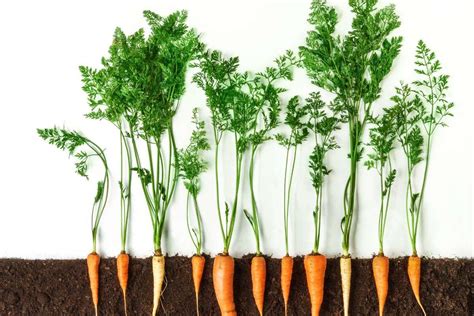Carrot Planting Guide: Optimal Timing

Carrot planting is a delicate process that requires careful consideration of timing to ensure optimal growth and yield. Carrots are a cool-season crop, which means they thrive in the cooler temperatures of spring or fall. In this article, we will explore the best times to plant carrots, taking into account factors such as climate, soil temperature, and weather conditions.
Understanding Carrot Growth Requirements

Carrots are a hardy, biennial crop that grows best in well-draining, loose soil with a pH between 6.0 and 6.8. They require full sun to partial shade and consistent moisture, especially during the germination and seedling stages. The ideal soil temperature for carrot growth is between 40°F and 75°F (4°C and 24°C), with the optimal temperature for germination being around 65°F (18°C). Soil temperature plays a critical role in carrot growth, as it affects the rate of germination, seedling emergence, and root development.
Spring Planting
In temperate climates, spring is an ideal time to plant carrots. As the soil begins to warm up after the winter, it’s essential to wait until the soil temperature reaches the optimal range for carrot growth. In areas with mild winters, carrots can be planted as early as 4-6 weeks before the last frost date. In regions with harsher winters, it’s best to wait until the soil can be worked in the spring, usually around late March or early April. Early spring planting allows carrots to mature before the onset of hot summer weather, which can lead to bolting and reduced yields.
| Region | Optimal Spring Planting Time |
|---|---|
| USDA Hardiness Zone 3-4 | Late April to early May |
| USDA Hardiness Zone 5-6 | Early to mid-April |
| USDA Hardiness Zone 7-8 | Late March to early April |

Fall Planting
Fall planting is another excellent option for growing carrots, especially in areas with hot summers. As the weather cools down, the soil temperature becomes more suitable for carrot growth. In temperate climates, carrots can be planted in late summer to early fall, about 8-10 weeks before the first frost date. Fall planting allows carrots to mature during the cooler months, reducing the risk of bolting and improving flavor and texture.
Regional Variations and Climate Considerations

Climate and regional conditions play a significant role in determining the optimal timing for carrot planting. In areas with mild winters, such as the southern United States, carrots can be planted year-round, with the exception of the hottest summer months. In regions with harsher winters, such as the northern United States, carrots are typically planted in the spring or fall, when the soil can be worked and the weather is cooler.
Soil Preparation and Sowing
Regardless of the planting time, it’s crucial to prepare the soil properly before sowing carrot seeds. The soil should be loose and well-draining, with a pH between 6.0 and 6.8. Carrot seeds are typically sown ¼ inch deep and ¼ inch apart, in rows that are 1-2 feet apart. Proper soil preparation and sowing techniques are essential for optimal carrot growth and yield.
- Test the soil pH and adjust it if necessary
- Remove any debris, rocks, or weeds from the soil
- Loosen the soil to a depth of 12 inches
- Sow carrot seeds at the recommended depth and spacing
What is the optimal soil temperature for carrot growth?
+The optimal soil temperature for carrot growth is between 40°F and 75°F (4°C and 24°C), with the ideal temperature for germination being around 65°F (18°C).
Can carrots be planted in the summer?
+In areas with hot summers, it’s best to avoid planting carrots during the summer months, as high temperatures can lead to bolting and reduced yields. Instead, plant carrots in the spring or fall, when the weather is cooler.
How often should I water my carrot plants?
+Carrot plants require consistent moisture, especially during the germination and seedling stages. Water the plants when the top inch of soil feels dry to the touch, usually every 2-3 days during hot weather and every 4-5 days during cooler weather.



